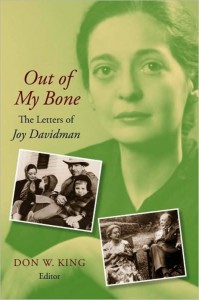 I’ve been reading the letters of Joy Davidman, who, before her untimely death from cancer at the age of 45, was, for the last few years of her life, the wife of C. S. Lewis.
I’ve been reading the letters of Joy Davidman, who, before her untimely death from cancer at the age of 45, was, for the last few years of her life, the wife of C. S. Lewis.
If you’ve ever seen the movie Shadowlands, you’ve seen an attempt by Hollywood to portray the relationship between the two, but it falls far short of reality. There are historical inaccuracies—even for the sake of artistic license, one must not stray too far—and C. S. Lewis himself is hardly recognizable; false perceptions abound, particularly of his presumed Oxford ivory-tower existence and his shaken faith at the end when Joy dies. Joy’s strength of character comes through in the film, but very little of her own vibrant Christianity.
Born into a Jewish household in New York City, with an atheist father and mother, Joy followed in their train, declaring at a young age that she was an atheist also. Her materialism led her into the Communist party, where she served as an editor and book and film critic on the New Masses, the party’s weekly magazine. She was an accomplished writer who had won a prize for a collection of her poems, and had some success also as a novelist. But it was all in service to the Communist party.
She became critical of the party over time. Her mind couldn’t rest in the platitudes, so she finally read Marx and Lenin seriously. She was appalled by the illogical nature of their arguments and the massive misinformation upon which they based them. Even prior to her disillusionment, she had begun reading outside the approved party list of books; C. S. Lewis was one of the authors she chanced upon.
In a letter to Chad Walsh, an English professor who had written the first book about C. S. Lewis, she explained how he impacted her:
We more than share your feeling for Lewis; with us it was not the last step but the first that came from reading his books, for we were raised atheists and took the truth of atheism for granted, and like most Marxists were so busy acting that we never stopped to think. If I hadn’t picked up The Great Divorce one day—brr, I suppose I’d still be running madly around with leaflets, showing as much intelligent purpose as a headless chicken.
 Joy began writing letters to Lewis, and he liked them, drawn to her intellect and wit. In another letter to Walsh, she details how they had been arguing certain points in those letters, and how he had answered her. It’s an insight into her mental capacity and willingness to be corrected:
Joy began writing letters to Lewis, and he liked them, drawn to her intellect and wit. In another letter to Walsh, she details how they had been arguing certain points in those letters, and how he had answered her. It’s an insight into her mental capacity and willingness to be corrected:
Just got a letter from Lewis in the mail. I think I told you I’d raised an argument or two on some points? Lord, he knocked my props out from under me unerringly; one shot to a pigeon. I haven’t a scrap of my case left. And, what’s more, I’ve seldom enjoyed anything more. Being disposed of so neatly by a master of debate, all fair and square—it seems to be one of the great pleasures of life, though I’d never have suspected it in my arrogant youth. I suppose it’s unfair tricks of argument that leave wounds. But after the sort of thing that Lewis does, what I feel is a craftsman’s joy at the sight of a superior performance.
Her own faith grew exponentially through her contact with Lewis, and she saw increasingly that one had to accept Jesus Christ on His terms, not create Him in one’s own image. As she related to another correspondent,
In many of them [the correspondent’s poems] you are explaining and sympathizing with Jesus, rather than accepting him—you are, indeed, not following Jesus but trying to get him to follow you; using him as an agency of your own special revolutionary theory.
I did this myself in the early days of my conversion; explained away what I didn’t like in the Gospel, valued Jesus not as the gateway to my own salvation, but as a means which I could use to support my own ideas—until it dawned on me that unless Jesus was God he was nothing, just another man with a handful of random ideas, and that all I valued such a man for was the accidental support his ideas gave my own position.
You see, I was still being my own God!
Although I’ve known and read about Joy Davidman Lewis for many years, this is the first time I’ve delved into her thought. Before, she was primarily just C. S. Lewis’s wife for a few short years, and that was why she was interesting to me. Now, I have a different perspective. She is interesting in her own right, and she has much to offer us through her writings. There is a reason why a confirmed bachelor like C. S. Lewis would abandon that lifestyle in his later years; he found a mind and heart that resonated with his.
